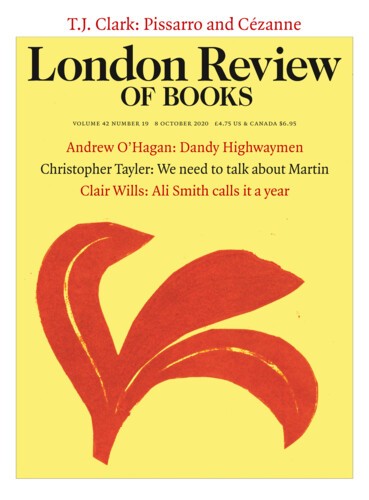Danny Ray, who died last week, spent forty-odd years as James Brown’s valet and body man. Off stage, he was in charge of the band’s uniforms. On stage, he was Brown’s master of ceremonies and ‘cape man’. It was a job that didn’t exist until Ray joined Brown’s entourage, in 1960 or 1961.
Alex Abramovich
Alex Abramovich is the author of Bullies: A Friendship. He teaches profile writing in the journalism school at New York University.
I hadn’t thought much about Eddie Van Halen since 1984, an album that was all over American radio the year I turned 12. But since his death earlier this month I’ve been thinking about him a lot, thanks to Greg Tate, the cultural critic and a co-founder, in the 1980s, of the Black Rock Coalition. ‘The Rolling Stone obit doesn’t even mention Eddie Van Halen’s Indonesian mother,’ Tate wrote on Facebook. ‘One very very baad baad man on the axe, no doubt, needless to say, but you know we couldn’t resist pointing out the de-bi-racialization of the Van Halen brothers by the white rock coalition media.’
Even When It’s a Big Fat Lie: ‘Country Music’
Alex Abramovich, 8 October 2020
In October 2017, two months after white supremacists held their ‘Unite the Right’ rally in Charlottesville, Virginia, Donald Trump’s (then) chief of staff, John Kelly, went on Fox News and delivered a history lesson. ‘The lack of an ability to compromise led to the Civil War,’ he said. ‘Men and women of good faith on both sides made their stand where...
The lack of specific dates speaks to the poverty that Frederick ‘Toots’ Hibbert was born into in May Pen, in south-central Jamaica, some time in 1942. He was the youngest of 14 children, or seven. Both his parents were preachers in what Hibbert sometimes called ‘a sort of clapping’ church. But when he was eight or thereabouts (these numbers vary too), Hibbert lost his mother, and a few years later his father. By 13, or 15 or 16, he was in Trench Town, working as a barber, boxing as an amateur, and singing. He must have cut hair for several years. Most interviews and articles you’ll find skip forward to 1961 or 1962, when, together with Nathaniel ‘Jerry’ Matthius and Henry ‘Raleigh’ Gordon, Hibbert formed the Maytals.
‘I fell in love with Neil’s pain,’ Carrie Snodgress said, recalling her life with Neil Young. Apparently, she meant physical pain: Young had back injuries from polio contracted at the age of six or seven, type 1 diabetes and epilepsy. But no matter how chronic, pain does not make for a solid foundation. The marriage ended. Young made an album about it, then shelved it. ‘It was a little too personal,’ he told Cameron Crowe in 1975. ‘It scared me.’
Podcasts & Videos
‘The categories are stupid’
Alex Abramovich and Thomas Jones
Alex Abramovich talks to Thomas Jones about the history of country from Jimmie Rodgers to Lil Nas X, by way of Dolly Parton (and Eddie Van Halen), and the problems with the labels that get applied to American...
Read anywhere with the London Review of Books app, available now from the App Store for Apple devices, Google Play for Android devices and Amazon for your Kindle Fire.
Sign up to our newsletter
For highlights from the latest issue, our archive and the blog, as well as news, events and exclusive promotions.


